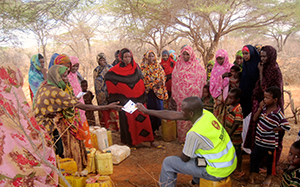
After five years as Deputy Head of Mission in Somalia, Dirir looks back on how things have changed – and what remains to be done in a country that’s caught in a chronic humanitarian crisis.
Dirir was born in Somalia. When civil war broke out, he and his family fled to Denmark. He stayed there to go to university. When he had finished studying, he decided to go back to Somalia and do his part to help improve the situation.
“I think leaving was the right thing to do, because if I’d stayed I might have become part of the problem. But I’m even more convinced that I did the right thing in returning to Somalia. In a way, it was an easy choice to make: I felt compelled to come back. And when I see a smile on the face of someone who’s benefited from SOLIDARITÉS INTERNATIONAL’s activities, I know I’m in the right place.”
A critical humanitarian situation
Somalia is still facing one of the world’s most critical humanitarian crises. In part, this is because the country is prone to natural disasters, particularly drought. “But a big part of the problem is man-made: hunger is a direct consequence of the conflict, which destroys livelihoods and causes displacement. Somalia is caught in the poverty trap.”
Even when the security situation has been tense, SOLIDARITÉS INTERNATIONAL has always chosen to stay on the ground, with the Somali people, providing relief on the basis of needs alone. “As a result, SOLIDARITÉS INTERNATIONAL’s field teams have gained the respect of communities, elders and local authorities. It took a lot of time and patience but today, I’m proud to say that our neutrality and impartiality are universally recognised. As a result, we are able to access zones which other NGOs can’t get to.”
Strengthening the self-sufficiency of the Somali people
“Although the power struggle between the different armed groups present in Somalia – including Al-Shabaab – is ongoing, for the humanitarian community, the biggest challenge is how to strengthen the self-sufficiency of the Somali people in order to help them break free of the poverty trap. All this in a political and security context that’s constantly evolving.
We must continue to meet the needs of the Somali people, particularly with regard to water, sanitation and hygiene, and food security and livelihoods. The main three livelihood groups in Somalia – nomadic peoples who raise livestock, river-dependent populations, and agropastoral communities – are all threatened with a lack of food and water. I truly believe that good governance is the single biggest factor that would improve life for the Somali people.“
